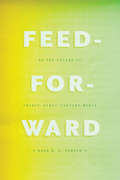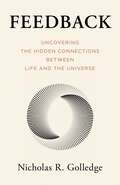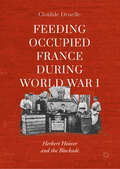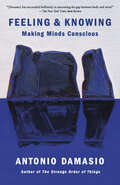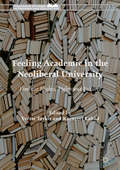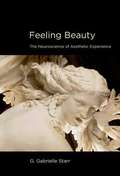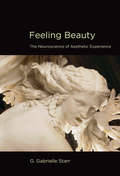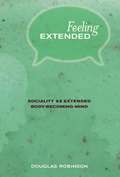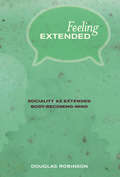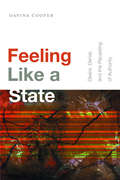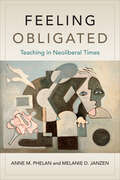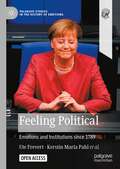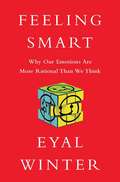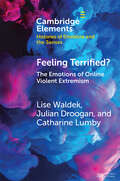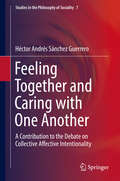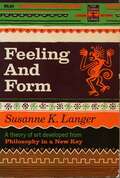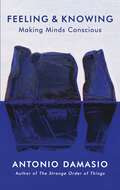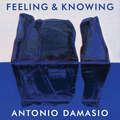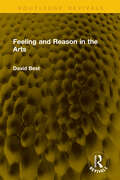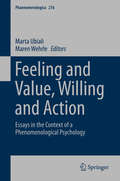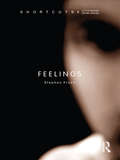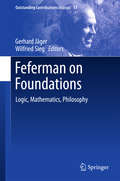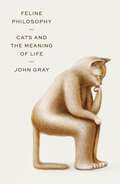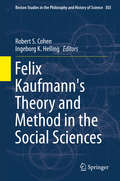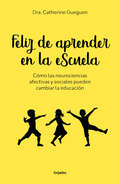- Table View
- List View
Feed-Forward: On the Future of Twenty-First-Century Media
by Mark B. N. HansenEven as media in myriad forms increasingly saturate our lives, we nonetheless tend to describe our relationship to it in terms from the twentieth century: we are consumers of media, choosing to engage with it. In Feed-Forward, Mark B. N. Hansen shows just how outmoded that way of thinking is: media is no longer separate from us but has become an inescapable part of our very experience of the world. Drawing on the speculative empiricism of philosopher Alfred North Whitehead, Hansen reveals how new media call into play elements of sensibility that greatly affect human selfhood without in any way belonging to the human. From social media to data-mining to new sensor technologies, media in the twenty-first century work largely outside the realm of perceptual consciousness, yet at the same time inflect our every sensation. Understanding that paradox, Hansen shows, offers us a chance to put forward a radically new vision of human becoming, one that enables us to reground the human in a non-anthropocentric view of the world and our experience in it.
Feedback: Uncovering the Hidden Connections Between Life and the Universe
by Nicholas R GolledgeWe live in a world where things come and go, rise and fall, grow and decay, tracing out cycles of change that are ordered and predictable.But amongst those well-behaved rhythms hide other phenomena, pulsing and fizzing and refusing to play by the same rules. Earth and the life upon it have evolved over billions of years to be right where we are now only because of feedbacks that pushed those systems until they broke. And then those systems adapted, reorganized, and rebuilt. With each new cycle of growth it was feedbacks that created order from disorder and gave rise to a world perfectly optimized for everything it needed to be. Now the latest scientific research is revealing that the exact same patterns that describe plate tectonics, evolution, and mass extinctions also emerge in the heartbeat of our everyday lives, underpinning everything from the cohesion of our social networks and personal relationships to our emotional well-being and spiritual beliefs. In Feedback, we embark on a backstage journey revealing how these lesser-known processes keep us operating right where we need to be, poised at the edge of chaos. In a world simultaneously threatened with social and environmental disasters this journey uncovers the hidden connections that unite us not just to those around us but also across vast scales of time and space to the very fabric of the universe
Feeding Occupied France during World War I: Herbert Hoover and the Blockade
by Clotilde DruelleThis book examines the history of Herbert Hoover’s Commission for Relief in Belgium, which supplied humanitarian aid to the millions of civilians trapped behind German lines in Belgium and Northern France during World War I. Here, Clotilde Druelle focuses on the little-known work of the CRB in Northern France, crossing continents and excavating neglected archives to tell the story of daily life under Allied blockade in the region. She shows how the survival of 2.3 million French civilians came to depend upon the transnational mobilization of a new sort of diplomatic actor—the non-governmental organization. Lacking formal authority, the leaders of the CRB claimed moral authority, introducing the concepts of a “humanitarian food emergency” and “humanitarian corridors” and ushering in a new age of international relations and American hegemony.
Feeling & Knowing: Making Minds Conscious
by Antonio DamasioFrom one of the world&’s leading neuroscientists: a succinct, illuminating, wholly engaging investigation of how biology, neuroscience, psychology, and artificial intelligence have given us the tools to unlock the mysteries of human consciousness In recent decades, many philosophers and cognitive scientists have declared the problem of consciousness unsolvable, but Antonio Damasio is convinced that recent findings across multiple scientific disciplines have given us a way to understand consciousness and its significance for human life. In the forty-eight brief chapters of Feeling & Knowing, and in writing that remains faithful to our intuitive sense of what feeling and experiencing are about, Damasio helps us understand why being conscious is not the same as sensing, why nervous systems are essential for the development of feelings, and why feeling opens the way to consciousness writ large. He combines the latest discoveries in various sciences with philosophy and discusses his original research, which has transformed our understanding of the brain and human behavior. Here is an indispensable guide to understanding how we experience the world within and around us and find our place in the universe.
Feeling Academic in the Neoliberal University: Feminist Flights, Fights and Failures (Palgrave Studies in Gender and Education)
by Yvette Taylor Kinneret LahadThis book offers a contemporary account of what it means to inhabit academia as a privilege, risk, entitlement or a failure. Drawing on international perspectives from a range of academic disciplines, it asks whether feminist spaces can offer freedom or flight from the corporatized and commercialized neoliberal university. How are feminist voices felt, heard, received, silenced, and masked? What is it to be a feminist academic in the neoliberal university? How are expectations, entitlements and burdens felt in inhabiting feminist positions and what of 'bad feeling' or 'unhappiness' amongst feminists? The volume consider these issues from across the career course, including from 'early career' and senior established scholars, as these diverse categories are themselves entangled in academic structures, sentiments and subjectivities; they are solidified in, for example, entry and promotion schemes as well as funding calls, and they ask us to identify in particular stages of 'being' or 'becoming' academic, while arguably denying the possibility of ever arriving. It will be essential reading for students and researchers in the areas of Education, Sociology, and Gender Studies.
Feeling Beauty
by G. Gabrielle StarrIn Feeling Beauty, G. Gabrielle Starr argues that understanding the neural underpinnings of aesthetic experience can reshape our conceptions of aesthetics and the arts. Drawing on the tools of both cognitive neuroscience and traditional humanist inquiry, Starr shows that neuroaesthetics offers a new model for understanding the dynamic and changing features of aesthetic life, the relationships among the arts, and how individual differences in aesthetic judgment shape the varieties of aesthetic experience. Starr, a scholar of the humanities and a researcher in the neuroscience of aesthetics, proposes that aesthetic experience relies on a distributed neural architecture -- a set of brain areas involved in emotion, perception, imagery, memory, and language. More important, it emerges from networked interactions, intricately connected and coordinated brain systems that together form a flexible architecture enabling us to develop new arts and to see the world around us differently. Focusing on the "sister arts" of poetry, painting, and music, Starr builds and tests a neural model of aesthetic experience valid across all the arts. Asking why works that address different senses using different means seem to produce the same set of feelings, she examines particular works of art in a range of media, including a poem by Keats, a painting by van Gogh, a sculpture by Bernini, and Beethoven's Diabelli Variations. Starr's innovative, interdisciplinary analysis is true to the complexities of both the physical instantiation of aesthetics and the realities of artistic representation.
Feeling Beauty: The Neuroscience of Aesthetic Experience
by G. Gabrielle StarrA theory of the neural bases of aesthetic experience across the arts, which draws on the tools of both cognitive neuroscience and traditional humanist inquiry.In Feeling Beauty, G. Gabrielle Starr argues that understanding the neural underpinnings of aesthetic experience can reshape our conceptions of aesthetics and the arts. Drawing on the tools of both cognitive neuroscience and traditional humanist inquiry, Starr shows that neuroaesthetics offers a new model for understanding the dynamic and changing features of aesthetic life, the relationships among the arts, and how individual differences in aesthetic judgment shape the varieties of aesthetic experience. Starr, a scholar of the humanities and a researcher in the neuroscience of aesthetics, proposes that aesthetic experience relies on a distributed neural architecture—a set of brain areas involved in emotion, perception, imagery, memory, and language. More important, it emerges from networked interactions, intricately connected and coordinated brain systems that together form a flexible architecture enabling us to develop new arts and to see the world around us differently. Focusing on the "sister arts" of poetry, painting, and music, Starr builds and tests a neural model of aesthetic experience valid across all the arts. Asking why works that address different senses using different means seem to produce the same set of feelings, she examines particular works of art in a range of media, including a poem by Keats, a painting by van Gogh, a sculpture by Bernini, and Beethoven's Diabelli Variations. Starr's innovative, interdisciplinary analysis is true to the complexities of both the physical instantiation of aesthetics and the realities of artistic representation.
Feeling Extended: Sociality as Extended Body-Becoming-Mind
by Douglas RobinsonThe extended-mind thesis (EMT), usually attributed to Andy Clark and David Chalmers, proposes that in specific kinds of mind-body-world interaction there emerges an extended cognitive system incorporating such extracranial supports as pencils, papers, computers, and other objects and environments in the world. In "Feeling Extended," Douglas Robinson accepts the thesis, but argues that the usual debate over EMT -- which centers on whether mind "really" (literally, actually, materially) extends to body and world or only "seems" to -- oversimplifies the issue. When we say that mind "feels" as if it extends, Robinson argues, what extends is precisely feeling -- and mind, insofar as it arises out of feeling. Robinson explores the world of affect and conation as intermediate realms of being between the physical movements of body and the qualitative movements of mind. He shows that affect is transcranial and tends to become interpersonal conation. Affective-becoming-conative sociality, he argues, is in fact the primary area in which body-becoming-mind extends. To make his case, Robinson draws on a wide spectrum of philosophical thought -- from the EMT and qualia debates among cognitivists to the prehistory of such debates in the work of Hegel and Peirce to continental challenges to Hegelianism from Bakhtin and Derrida -- as well as on extensive empirical research in social psychology and important sociological theories of face (Goffman), ritual (Connerton), and habitus (Bourdieu).
Feeling Extended: Sociality as Extended Body-Becoming-Mind
by Douglas RobinsonA new view of the extended mind thesis argues that a stark binary opposition between really extending and seeming to extend oversimplifies the issue.The extended-mind thesis (EMT), usually attributed to Andy Clark and David Chalmers, proposes that in specific kinds of mind-body-world interaction there emerges an extended cognitive system incorporating such extracranial supports as pencils, papers, computers, and other objects and environments in the world. In Feeling Extended, Douglas Robinson accepts the thesis, but argues that the usual debate over EMT—which centers on whether mind really (literally, actually, materially) extends to body and world or only seems to—oversimplifies the issue. When we say that mind feels as if it extends, Robinson argues, what extends is precisely feeling—and mind, insofar as it arises out of feeling.Robinson explores the world of affect and conation as intermediate realms of being between the physical movements of body and the qualitative movements of mind. He shows that affect is transcranial and tends to become interpersonal conation. Affective-becoming-conative sociality, he argues, is in fact the primary area in which body-becoming-mind extends. To make his case, Robinson draws on a wide spectrum of philosophical thought—from the EMT and qualia debates among cognitivists to the prehistory of such debates in the work of Hegel and Peirce to continental challenges to Hegelianism from Bakhtin and Derrida—as well as on extensive empirical research in social psychology and important sociological theories of face (Goffman), ritual (Connerton), and habitus (Bourdieu).
Feeling Like a State: Desire, Denial, and the Recasting of Authority (Global and Insurgent Legalities)
by Davina CooperA transformative progressive politics requires the state's reimagining. But how should the state be reimagined, and what can invigorate this process? In Feeling Like a State, Davina Cooper explores the unexpected contribution a legal drama of withdrawal might make to conceptualizing a more socially just, participative state. In recent years, as gay rights have expanded, some conservative Christians—from charities to guesthouse owners and county clerks—have denied people inclusion, goods, and services because of their sexuality. In turn, liberal public bodies have withdrawn contracts, subsidies, and career progression from withholding conservative Christians. Cooper takes up the discourses and practices expressed in this legal conflict to animate and support an account of the state as heterogeneous, plural, and erotic. Arguing for the urgent need to put new imaginative forms into practice, Cooper examines how dissident and experimental institutional thinking materialize as people assert a democratic readiness to recraft the state.
Feeling Obligated: Teaching in Neoliberal Times
by Anne M. Phelan Melanie D. JanzenFeeling Obligated combines theoretical insights with the first-hand experiences of Canadian teachers to illustrate the impact of neoliberalism – the installation of market norms into educational and social policies – on teachers’ professional integrity. Anne M. Phelan and Melanie D. Janzen illustrate the miserable conditions in which teachers teach, their efforts to navigate and withstand those circumstances, and their struggle to respond ethically to students, especially those already marginalized economically and socially. Exploring how educational policies attempt to recast teachers as skilled clinicians, the book revitalizes a conversation about teaching as a vocation wherein the challenge of obligation is of central concern. Haunted by what has already happened and threatened by what may yet occur, Feeling Obligated foregrounds the challenge of ethical obligation in teaching and makes a strong case for the revitalization of teaching as a vocation, involving commitment, resolve, and trust in a future yet to come.
Feeling Political: Emotions and Institutions since 1789 (Palgrave Studies in the History of Emotions)
by Ute Frevert Michael Amico Francesco Buscemi Caroline Moine Philipp Nielsen Hannah Malone Juliane Brauer Kerstin Maria Pahl Agnes Arndt Karsten Lichau Julia WambachHistoricizing both emotions and politics, this open access book argues that the historical work of emotion is most clearly understood in terms of the dynamics of institutionalization. This is shown in twelve case studies that focus on decisive moments in European and US history from 1800 until today. Each case study clarifies how emotions were central to people’s political engagement and its effects. The sources range from parliamentary buildings and social movements, to images and speeches of presidents, from fascist cemeteries to the International Criminal Court. Both the timeframe and the geographical focus have been chosen to highlight the increasingly participatory character of nineteenth- and twentieth-century politics, which is inconceivable without the work of emotions.
Feeling Smart: Why Our Emotions Are More Rational Than We Think
by Eyal WinterDistinguished authors like Daniel Kahneman, Dan Ariely, and Nassim Nicholas Taleb have written much about the flaws in the human brain when it comes time to make a decision. Our intuitions and passions frequently fail us, leading to outcomes we don't want. In this book, Eyal Winter, Professor of Economics and Director of the Center for the Study of Rationality at the Hebrew University of Jerusalem, wonders: why? If our emotions are so destructive and unreliable, why has evolution left us with them? The answer is that, even though they may not behave in a purely logical manner, our emotions frequently lead us to better, safer, more optimal outcomes. In fact, as Winter discovers, there is often logic in emotion, and emotion in logic. For instance, many mutually beneficial commitments--such as marriage, or being a member of a team--are only possible when underscored by emotion rather than deliberate thought. The difference between pleasurable music and bad noise is mathematically precise; yet it is also the result of evolution. And our inherent overconfidence--the mathematically impossible fact that most people see themselves as above average--affords us advantages in competing for things we benefit from, like food and money and romance. Other subjects illuminated in the book include the rationality of seemingly illogical feelings like trust, anger, shame, ego, and generosity. Already a bestseller in Israel, Feeling Smart brings together game theory, evolution, and behavioral science to produce a surprising and very persuasive defense of how we think, even when we don't.
Feeling Terrified?: The Emotions of Online Violent Extremism (Elements in Histories of Emotions and the Senses)
by Julian Droogan Lise Waldek Catharine LumbyThis Element presents original research into how young people interact with violent extremist material, including terrorist propaganda, when online. It explores a series of emotional and behavioural responses that challenge assumptions that terror or trauma are the primary emotional responses to these online environments. It situates young people's emotional responses within a social framework, revealing them to have a relatively sophisticated relationship with violent extremism on social media that challenges simplistic concerns about processes of radicalisation. The Element draws on four years of research, including quantitative surveys and qualitative focus groups with young people, and presents a unique perspective drawn from young people's experiences.
Feeling Together and Caring with One Another: A Contribution to the Debate on Collective Affective Intentionality (Studies in the Philosophy of Sociality)
by Héctor Andrés Sánchez GuerreroThis book examines the human ability to participate in moments of joint feeling. It presents an answer to the question concerning the nature of our faculty to share in what might be called episodes of collective affective intentionality. The proposal develops the claim that our capacity to participate in such episodes is grounded in an ability central to our human condition: our capacity to care with one another about certain things.The author provides a phenomenologically adequate account of collective affective intentionality that takes seriously the idea that feelings are at the core of our emotional relation to the world. He details a form of group emotional orientation that relies on the fact that the participating individuals have come to share a number of concerns. Readers will learn that at the heart of a collective affective intentional episode, one does not merely find a set of shared concerns, but also a particular mode of caring.In the end, the argument presented in this monograph makes plausible the idea that the emotions through which humans participate in moments of affective intentional community express our nature. In addition, it shows that the debate on collective affective intentionality also permits us to better understand the relationship between two conflicting philosophical pictures of ourselves: the idea that we are essentially social beings and the claim that we are creatures for whom our personal existence is an issue.Thus, aiming at an elucidation of the nature of our ability to feel together, the book offers a detailed account of what it is to situationally express our human nature by caring about something in a properly joint manner.
Feeling and Form: A Theory of Art Developed from Philosophy in a New Key
by Susanne K. LangerIn Philosophy in a New Key, Susanne Langer developed a theory of symbolism, there applied to music, which she felt could be developed to embrace all the arts. In Feeling and Form she did just that. It offers the reader nothing less than a systematic, comprehensive theory of art, applied in turn to painting, sculpture, architecture, literature, music, the dance, drama and film.
Feeling and Knowing: Making Minds Conscious
by Antonio DamasioIn recent decades, many philosophers and cognitive scientists have declared the question of consciousness unsolvable, but Antonio Damasio is convinced that recent findings in neuroscience, psychology and artifical intelligence have given us the necessary tools to solve its mystery. In Feeling & Knowing, Damasio elucidates the myriad aspects of consciousness and presents his analysis and new insights in a way that is faithful to our own intuitive sense of the experience.In forty-eight brief chapters, Damasio helps us understand the relation between consciousness and the mind; why being conscious is not the same as either being awake or sensing; the central role of feeling; and why the brain is essential for the development of consciousness. He synthesises the recent findings of various sciences with the philosophy of consciousness, and, most significantly, presents his original research which has transformed our understanding of the brain and human behaviour.Here is an indispensable guide to understanding the fundamental human capacity for informing and transforming our experience of the world around us and our perception of our place in it.
Feeling and Knowing: Making Minds Conscious
by Antonio DamasioIn recent decades, many philosophers and cognitive scientists have declared the question of consciousness unsolvable, but Antonio Damasio is convinced that recent findings in neuroscience, psychology and artifical intelligence have given us the necessary tools to solve its mystery. In Feeling & Knowing, Damasio elucidates the myriad aspects of consciousness and presents his analysis and new insights in a way that is faithful to our own intuitive sense of the experience.In forty-eight brief chapters, Damasio helps us understand the relation between consciousness and the mind; why being conscious is not the same as either being awake or sensing; the central role of feeling; and why the brain is essential for the development of consciousness. He synthesises the recent findings of various sciences with the philosophy of consciousness, and, most significantly, presents his original research which has transformed our understanding of the brain and human behaviour.Here is an indispensable guide to understanding the fundamental human capacity for informing and transforming our experience of the world around us and our perception of our place in it.
Feeling and Reason in the Arts (Routledge Revivals)
by David BestFirst published in 1985, Feeling and Reason in the Arts raises an important question-how can a central role for the arts, and in particular the arts in education, be justified? The arts and the artistic judgments are often expressions of individual feeling and value, and it is a common belief that this necessarily implies a subjectivism that is incompatible with the notion that artistic judgments can be rationally supported. If this belief is correct there is clearly a problem about how the arts can be justified in education.This book shows that this dilemma can be resolved only if one recognises that it is created by incoherently narrow and oversimple conceptions of rational justification and feeling. With more adequate conceptions, a sound argument can be provided for the place and value of the arts, in education, and in society more generally. Clearly these issues are of crucial practical relevance at a time when the arts are under threat. This exposition of arguments in their support is important and timely. This is an interesting work for scholars and researchers of arts and philosophy.
Feeling and Value, Willing and Action
by Marta Ubiali Maren WehrleThis volume explores the role and status of phenomena such as feelings, values, willing, and action in the domain of perception and (social) cognition, as well as the way in which they are related. In its exploration, the book takes Husserl's lifelong project Studien zur Struktur des Bewusstseins (1909-1930) as its point of departure, and investigates these phenomena with Husserl but also beyond Husserl. Divided into two parts, the volume brings together essays that address the topics from different phenomenological, philosophical, and psychological perspectives. They discuss Husserl's position in dialogue with historical and recent philosophical and psychological debates and develop phenomenological accounts and descriptions with the help of Geiger, Heidegger, Merleau-Ponty, Plessner, Sartre, Scheler, Schopenhauer, and Reinach.
Feelings (Shortcuts)
by Stephen FroshEveryone talks about their feelings, but what exactly are they? What are the distinguishing features of feelings, and how do they differ from emotions and affects? How do our feelings influence the kinds of people we are, and the sorts of communities and societies in which we live? In this wonderful short book, acclaimed author Stephen Frosh interrogates the terrain of feelings and asks how this ‘hidden’ dimension of the self helps shape our worlds. The book provides an accessible and thought-provoking introduction to the major debates around feelings in the modern world. Feelings is an accessible and engaging resource for students, academics, and indeed anyone with an interest in gaining a better understanding of this fundamental area of life.
Feferman on Foundations: Logic, Mathematics, Philosophy (Outstanding Contributions To Logic Ser. #13)
by Gerhard Jäger Wilfried SiegThis volume honours the life and work of Solomon Feferman, one of the most prominent mathematical logicians of the latter half of the 20th century. In the collection of essays presented here, researchers examine Feferman’s work on mathematical as well as specific methodological and philosophical issues that tie into mathematics. Feferman’s work was largely based in mathematical logic (namely model theory, set theory, proof theory and computability theory), but also branched out into methodological and philosophical issues, making it well known beyond the borders of the mathematics community.With regard to methodological issues, Feferman supported concrete projects. On the one hand, these projects calibrate the proof theoretic strength of subsystems of analysis and set theory and provide ways of overcoming the limitations imposed by Gödel’s incompleteness theorems through appropriate conceptual expansions. On the other, they seek to identify novel axiomatic foundations for mathematical practice, truth theories, and category theory.In his philosophical research, Feferman explored questions such as “What is logic?” and proposed particular positions regarding the foundations of mathematics including, for example, his “conceptual structuralism.” The contributing authors of the volume examine all of the above issues. Their papers are accompanied by an autobiography presented by Feferman that reflects on the evolution and intellectual contexts of his work. The contributing authors critically examine Feferman’s work and, in part, actively expand on his concrete mathematical projects. The volume illuminates Feferman’s distinctive work and, in the process, provides an enlightening perspective on the foundations of mathematics and logic.
Feline Philosophy: Cats and the Meaning of Life
by John GrayThe author of Straw Dogs, famous for his provocative critiques of scientific hubris and the delusions of progress and humanism, turns his attention to cats—and what they reveal about humans' torturous relationship to the world and to themselves. The history of philosophy has been a predictably tragic or comical succession of palliatives for human disquiet. Thinkers from Spinoza to Berdyaev have pursued the perennial questions of how to be happy, how to be good, how to be loved, and how to live in a world of change and loss. But perhaps we can learn more from cats--the animal that has most captured our imagination--than from the great thinkers of the world. In Feline Philosophy, the philosopher John Gray discovers in cats a way of living that is unburdened by anxiety and self-consciousness, showing how they embody answers to the big questions of love and attachment, mortality, morality, and the Self: Montaigne's house cat, whose un-examined life may have been the one worth living; Meo, the Vietnam War survivor with an unshakable capacity for "fearless joy"; and Colette's Saha, the feline heroine of her subversive short story "The Cat", a parable about the pitfalls of human jealousy. Exploring the nature of cats, and what we can learn from it, Gray offers a profound, thought-provoking meditation on the follies of human exceptionalism and our fundamentally vulnerable and lonely condition. He charts a path toward a life without illusions and delusions, revealing how we can endure both crisis and transformation, and adapt to a changed scene, as cats have always done.
Felix Kaufmann's Theory and Method in the Social Sciences
by Robert S. Cohen Ingeborg K. HellingThis volume contains the English translation of Felix Kaufmann's (1895-1945) main work Methodenlehre der Sozialwissenschaften (1936). In this book, Kaufmann develops a general theory of knowledge of the social sciences in his role as a cross-border commuter between Husserl's phenomenology, Kelsen's pure theory of law and the logical positivism of the Vienna Circle. This multilayered inquiry connects the value-oriented reflections of a general philosophy of science with the specificity of the methods and theories of the social sciences, as opposed to abstract natural science and psychology. The core focus of the study is the attempt to elucidate how and under what conditions scientific knowledge about social facts, empirically justified and theoretically embedded, can be obtained. The empirical basis of knowledge within the social sciences forms a phenomenological concept of experience. According to Kaufmann, this concept of experience exhibits a complex structure. Within the meaning-interpretation of human action as the core of knowledge in the social sciences, this structure reaches out across the isolated act of verification toward the synthesis of external and internal experiences. The book opens with a detailed and useful introduction by Ingeborg K. Helling, which introduces the historical and theoretical background of Kaufmann's study and specifically illuminates his relation to Alfred Schütz and John Dewey. Finally, it contains interviews with and letters to members of his family, colleagues and students.
Feliz de aprender en la escuela
by Catherine GueguenTodos los niños sienten, en los primeros años de su vida, una necesidad innata de aprender. Sin embargo, son muchos los que al llegar a la escuela frenan su creatividad, parecen no encajar y muestran síntomas de ansiedad y de frustración. ¿Qué está pasando? Para Catherine Gueguen, pediatra, especialista en comunicación no verbal y un nombre de referencia en la educación de los más pequeños, la causa se halla en un modelo educativo obsoleto, centrado en las relaciones de poder, la disciplina y el castigo, y eso, para el cerebro de un niño -maleable, inmaduro y frágil en grado sumo-, es tremendamente perjudicial. En opinión de Gueguen, la única forma de cambiar el sistema es replantear, y sobre todo reivindicar, la figura del profesor, y la clave para ello es la empatía. El profesor debe fomentar por encima de todo la empatía: - escuchar, - respetar - y animar al alumno a expresar sus emociones, sean estas buenas o malas. En definitiva, hacer del aula un lugar donde el niño o el adolescente se sienta seguro, valorado y querido. El resultado, como demuestran los cientos de estudios científicos y los testimonios que acompañan a este libro, no puede ser más alentador: el niño no solo se siente más contento, más comprometido y participativo en el aula, sino que su rendimiento escolar también mejora.
